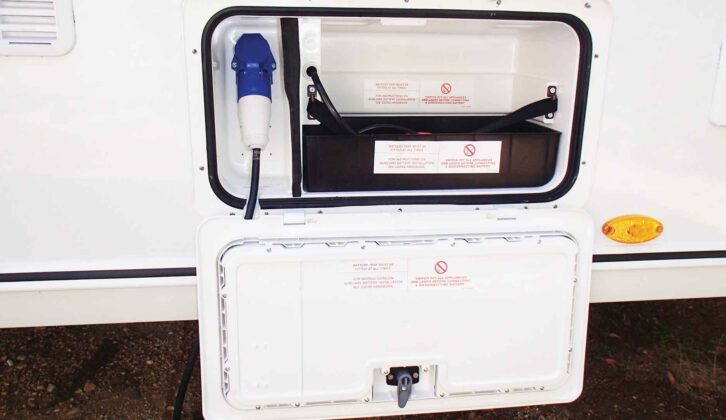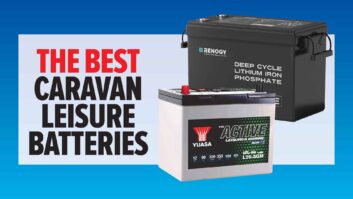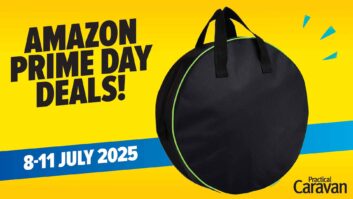Leisure batteries are an essential piece of caravan kit, storing 12V DC electricity and allowing us to power crucial touring appliances such as lighting, as well as our favourite touring gadgets, such as the best caravan TV. However, before you think about buying one, you’re likely to ask ‘what size leisure battery do I need for a caravan?’.
Depending on the devices it is powering, the best caravan leisure battery is capable of providing electric current for hours. When the size of a leisure battery is discussed, it will generally relate to its capacity, which is measured in ampere-hours (Ah), but you are also going to want to factor in its dimensions (typically in cm or mm) to make sure it fits your tourer’s battery compartment. You’ll also want to factor in its NCC rating to make sure you have the right Class of battery for your needs.
In this guide, we’ll talk you through the crucial considerations of this caravan essential to ensure you get the best size for your tourer.
Choosing the right size leisure battery for a caravan
The Ah rating
The NCC battery scheme
Dimensions and weight
The Ah rating
First, we’ll look at Ah. The leisure batteries with a bigger Ah will be able to operate the more powerful accessories. In theory, a 100Ah battery would discharge 1A for 100 hours or 5A for 20 hours. However, the reality is, assuming it is a flooded lead-acid battery which is the most popular type, it should only discharge to a maximum of 50% to prevent any damage from occurring.
Other types of batteries have their own discharge rate – for instance, lithium leisure batteries, which are more powerful, can have a discharge rate of 80%, although it’s worth noting they will generally be more expensive, too.
It’s worth factoring in that Ah figures are worked out at conditions of 25°C – if you’re at 0°C, around 20% can be knocked off.

What this means is that you need to know the type of gadgets you’re going to want to power with your leisure battery – and know what their power requirements are, too. For instance, if you’re just looking for a leisure battery that can power the bare minimum, such as lights, and are only intending to take short tours, an Ah of 60 will most likely be enough.
However, when it comes to powering touring gadgets such as an auto-leveller or a motor mover, a leisure battery of over 100Ah is required – either check on the manufacturer’s website or contact them to find out what your appliances require.
There are also options that can reach 200Ah – these more powerful options are going to be more suitable for caravanning off grid.
The NCC battery scheme
Before buying one, you will also need to check its rating to ensure it will meet your requirements.
Former Practical Caravan editor Nigel Donnelly explains: “One thing that ensures a battery reaches a minimum standard of quality is to find products accredited under the National Caravan Council (NCC) Verified Leisure Battery Scheme (VLBS).
“The NCC is the independent organisation that enforces standards and promotes best practice in the UK leisure vehicle industry. The VLBS makes sure leisure batteries used in caravans meet minimum standards and helps to reassure consumers that what they are buying is not rubbish.”
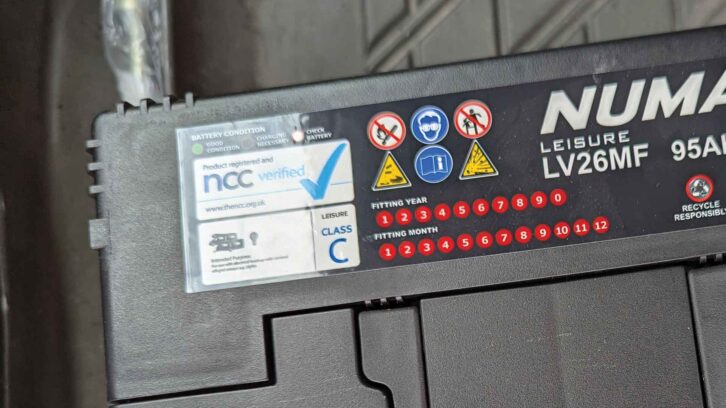
The scheme rates each battery assessed with one of three class ratings: Class A, Class B or Class C.
- Class A batteries are the highest capacity cells, designed for off-grid use powering high-demand appliances.
- Class B batteries are suitable for vans predominantly on an electrical supply, but able to support smaller appliances when not hooked up, and motor movers.
- Class C batteries have the lowest capacity and are intended for short stays away from a power source, supporting only low-demand equipment like lights.
When Nigel was choosing one for his project caravan, he decided: “Our requirements are at the more basic end of the spectrum, so a C-rated battery would be sufficient for our needs.”
Dimensions and weight
The final factor to consider is the actual dimensions of the leisure battery. Knowing this will allow you to make sure you have the space for the size you are thinking of opting for – the bigger the capacity, the larger its dimensions and heavier its weight will generally be.
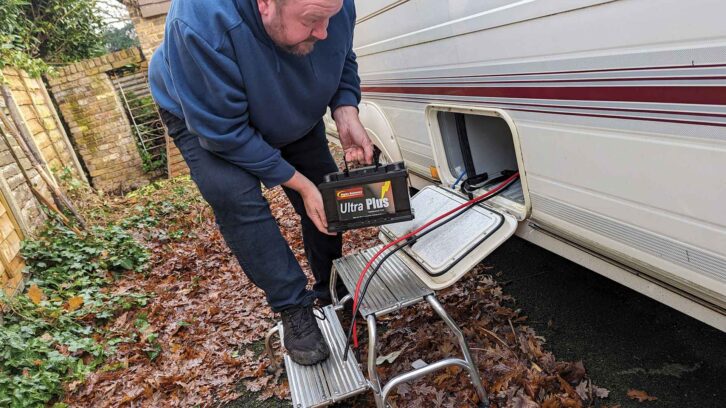
As a result, make sure you check the size of your battery compartment and compare it to the dimensions of the battery to ensure it will fit. Don’t forget your caravan weights either – you need to check you have the payload allocation to accommodate it, so prior to buying it and having it installed.
The verdict on what size leisure battery do you need for a caravan
In many ways, the same principles that apply to choosing a leisure battery will apply to any touring accessory: know what you want it for before you buy it and know how it will work in the context of your tourer, too. There’s no point buying a less powerful option if you want to operate a motor mover, for example – instead, you will want one that is over 100Ah. In contrast, off-gridders will be better suited to a leisure battery that can reach 200Ah.
Know what you want to use it for and where you’re likely to tour, too, to ensure that you get an appropriate Class of battery.
Just make sure you remember to measure your tourer’s battery locker, and check its weight first.
After sorting your tourer’s battery, you may turn your attention to the touring gadgets you want to take with you. One question that could arise here is the type of TV to get for your van – our guide to “will a smart TV work in a caravan?” will help here, as we consider the crucial points.
Written with contributions from Nigel Donnelly.
Future Publishing Limited, the publisher of practicalcaravan.com, provides the information in this article in good faith and makes no representation as to its completeness or accuracy. Individuals carrying out the instructions do so at their own risk and must exercise their independent judgement in determining the appropriateness of the advice to their circumstances. Individuals should take appropriate safety precautions and be aware of the risk of electrocution when dealing with electrical products. To the fullest extent permitted by law, neither Future nor its employees or agents shall have any liability in connection with the use of this information. You should check that any van warranty will not be affected before proceeding with DIY projects.
If you enjoyed reading this article, why not get the latest news, reviews and features delivered to your door or inbox every month? Take advantage of our brilliant Practical Caravan SUBSCRIBERS’ OFFER and SIGN UP TO OUR NEWSLETTER for regular weekly updates on all things caravan related.
